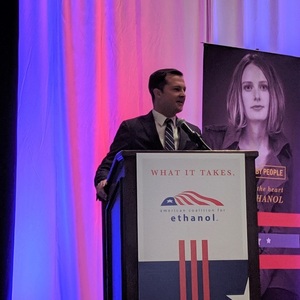ACE conference: USGC optimistic about future of ethanol exports

PHOTO: Matt Thompson
August 15, 2019
BY Matt Thompson
The American Coalition for Ethanol kicked off its annual conference in Omaha today. While there was some discussion of the state of the industry and the harm done by small refinery exemptions, there were also messages of optimism.
One of those messages came from Ryan LeGrand, president and CEO of the U.S. Grains Council. LeGrand outlined for attendees some of USGC’s efforts to open new export markets, and to grow current ones, for U.S. ethanol. “There’s nothing more important to us than ethanol right now,” he said. “Ethanol is the fastest growing agricultural export that we have today, and it has been for the last 10 years.”
LeGrand outlined efforts in Mexico, and while ethanol blending is still prohibited in Mexico’s three largest cities, LeGrand said that should change. “We expect that to change and the entire market will open this year,” he said. He added that the Mexican market is currently 720 million gallons, but with the ability for those cities to blend ethanol, the market could grow to 1.2 billion gallons.
Advertisement
He also mentioned the recent visit to Iowa of Mexican fuel retailers, which was hosted by ACE, USCG and IRFA. He said the visit was a good one and the retailers are “ready to go” in terms of purchasing U.S. ethanol.
LeGrand also told attendees he’s optimistic of the future of trade with China. “I truly believe we’ll get back to normal trade with them,” he said. He added that the country’s goal of attaining E10 by 2020 isn’t possible without the U.S. market. “They’re never going to get there without our help. So, again, we need to get back to business as usual there,” he said, adding the Chinese market is potentially 3 billion gallons.
Advertisement
He also expressed optimism about trade with India. He said although the country doesn’t currently import U.S. ethanol for fuel, they can’t produce enough domestically to meet its E10 mandate. He said USGC has proposed meeting as much of the mandate as possible with their domestic supply, and then filling the rest of the demand with imports, mainly from U.S. ethanol. “We expect to compete there, should they open up to this idea we presented to them,” he said.
Japan is also a potential market for U.S. ethanol. LeGrand said the country recently received it’s first shipment of ETBE containing U.S. ethanol, and USCG’s goal is to move the country to E10.
LeGrand also invited attendees to get involved with promoting trade. “When trade works, the world wins,” he said.
Related Stories
U.S. fuel ethanol capacity fell slightly in April, while biodiesel and renewable diesel capacity held steady, according to data released by the U.S. EIA on June 30. Feedstock consumption was down when compared to the previous month.
XCF Global Inc. on July 8 provided a production update on its flagship New Rise Reno facility, underscoring that the plant has successfully produced SAF, renewable diesel, and renewable naphtha during its initial ramp-up.
The U.S. exported 31,160.5 metric tons of biodiesel and biodiesel blends of B30 and greater in May, according to data released by the USDA Foreign Agricultural Service on July 3. Biodiesel imports were 2,226.2 metric tons for the month.
The USDA’s Risk Management Agency is implementing multiple changes to the Camelina pilot insurance program for the 2026 and succeeding crop years. The changes will expand coverage options and provide greater flexibility for producers.
EcoCeres Inc. has signed a multi-year agreement to supply British Airways with sustainable aviation fuel (SAF). The fuel will be produced from 100% waste-based biomass feedstock, such as used cooking oil (UCO).
Upcoming Events










